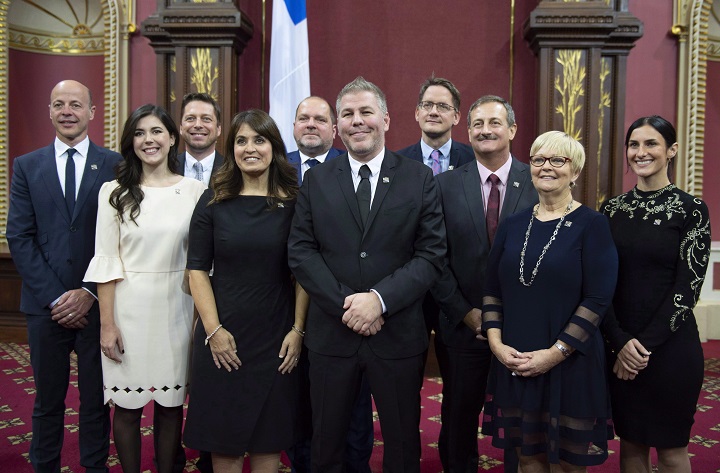Key members of the Parti Québécois (pQ) met on Saturday as the once-mighty sovereigntist party looks for a way forward following its crushing defeat in October’s provincial election.

After a loss that saw the party’s seat count plummet from 28 to 10, some have questioned the amount of focus placed on independence, as well as then-leader Jean-Francois Lisée’s campaign decisions.
One defeated ex-candidate, Jean-Martin Aussant, has suggested in an open letter to the newspaper Le Devoir that the party should essentially be disbanded and created anew.
READ MORE: Parti Québécois names Pascal Bérubé as interim leader
But in public, at least, the party’s interim leader seemed reluctant to endorse such drastic solutions.
“I think it’s too soon for those kind of ideas,” Pascal Bérubé told reporters ahead of a gathering of riding presidents and members of the party executive at a Montreal college.
“What we have to do today is look at the last election: what we could do differently, and the good things as well. We have four years. We’re not going to hurry anything.”
READ MORE: Parti Québécois Leader Jean-François Lisée steps down after losing own riding of Rosemont
The PQ garnered only 17 per cent of the popular vote in October and lost official party status.

Get daily National news
But in Bérubé’s estimation, the result was more a rejection of the governing Liberals than of his own party.
In their hunger for change, voters turned to François Legault’s Coalition Avenir Québec, which has never before formed government.
“Quebecers wanted to get rid of the Liberals, and decided the (Coalition) was the best vehicle to get there,” Bérubé said.
“Why weren’t we that alternative, and how can we become it in the next election?”
Lisée, who was scheduled to give a half-hour presentation to party members at the closed-door meeting, had a similar message.
“Humility is also being able to say the election wasn’t about us,” he told reporters. “It was about getting rid of the Liberals.”
The Parti Québécois, which for 50 years has led the drive to make Quebec an independent country, has been left in disarray by the vote.
Lisée’s resignation after he lost his own seat in the Montreal-area riding of Rosemont means the party will have to hold its third leadership race since 2015.
WATCH: Quebecers across the province are mourning the loss of former premier Bernard Landry

The recent death of former premier Bernard Landry has highlighted the fact that the pioneering generation of Quebec sovereigntists is dwindling.
And younger sovereigntists seem to be increasingly turning towards the small, left-wing party Québec solidaire, which more than tripled its seat count in the legislature to 10 seats.
Understandably, some of the post-election debate has focused on Lisée’s performance.
READ MORE: Québec Solidaire’s Manon Massé vows party is ‘bigger, stronger and more resolute’ than ever
In particular, some have questioned his decision to focus his attacks in the waning days of the campaign on Québec solidaire‘s popular co-spokesperson and to question the party’s structure, which includes two spokespersons but no leader.
Others have wondered whether Lisée’s promise not to hold a referendum until at least 2022 left the party without it’s raison d’etre.
Bérubé declined to comment on whether the referendum position had been a mistake, saying only that the party would review its strategy in the future.
“We are sovereigntists, but for the rest we’re open,” he said.
Lisée, for his part, denied having made any major errors in the campaign.
He maintained that his decision in the third leaders’ debate to question Québec solidaire’s Manon Massé on who really “pulls the strings” in her party saved the PQ from slipping from third to fourth.







Comments